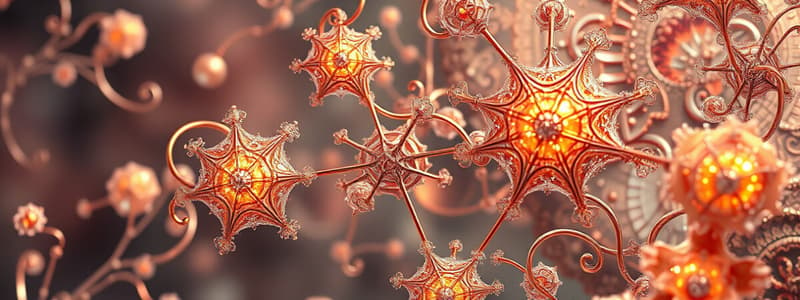Podcast
Questions and Answers
What is the coordination number of the central atom in the complex ion [PtCl6]?
What is the coordination number of the central atom in the complex ion [PtCl6]?
- 4
- 8
- 6 (correct)
- 2
Which coordination number is associated with the complex ion [Ni(NH3)4]?
Which coordination number is associated with the complex ion [Ni(NH3)4]?
- 2
- 6
- 8
- 4 (correct)
In the complex K4[Fe(CN)6], what does the term 'coordination sphere' refer to?
In the complex K4[Fe(CN)6], what does the term 'coordination sphere' refer to?
What characteristic of a compound makes it paramagnetic?
What characteristic of a compound makes it paramagnetic?
Which of the following compounds is diamagnetic?
Which of the following compounds is diamagnetic?
What type of hybridization occurs in square planar complexes like [Ni(CN)4]2–?
What type of hybridization occurs in square planar complexes like [Ni(CN)4]2–?
What is the oxidation state of nickel in the complex [Ni(CN)4]2–?
What is the oxidation state of nickel in the complex [Ni(CN)4]2–?
What can magnetic susceptibility experiments reveal about coordination compounds?
What can magnetic susceptibility experiments reveal about coordination compounds?
Which of the following is NOT true about hybrid orbitals?
Which of the following is NOT true about hybrid orbitals?
In coordination compounds, what does the term 'low spin complex' imply?
In coordination compounds, what does the term 'low spin complex' imply?
How many unpaired electrons would a diamagnetic compound have?
How many unpaired electrons would a diamagnetic compound have?
What causes the color of coordination compounds according to crystal field theory?
What causes the color of coordination compounds according to crystal field theory?
What happens to the color of a coordination compound in the absence of ligands?
What happens to the color of a coordination compound in the absence of ligands?
What color is anhydrous CuSO4?
What color is anhydrous CuSO4?
When nickel(II) chloride is dissolved in water, which complex is formed?
When nickel(II) chloride is dissolved in water, which complex is formed?
What color does [Ti(H2O)6]Cl3 exhibit?
What color does [Ti(H2O)6]Cl3 exhibit?
Which type of complexes can exhibit cis and trans isomerism?
Which type of complexes can exhibit cis and trans isomerism?
What type of isomerism occurs when three donor atoms of the same ligands occupy adjacent positions in an octahedral complex?
What type of isomerism occurs when three donor atoms of the same ligands occupy adjacent positions in an octahedral complex?
Which geometrical isomer has ligands positioned around the meridian of the octahedral complex?
Which geometrical isomer has ligands positioned around the meridian of the octahedral complex?
What type of coordination entity can exhibit geometrical isomerism with didentate ligands present?
What type of coordination entity can exhibit geometrical isomerism with didentate ligands present?
Why is geometrical isomerism not possible in tetrahedral complexes with two different unidentate ligands?
Why is geometrical isomerism not possible in tetrahedral complexes with two different unidentate ligands?
Which ligands would be considered a didentate ligand in the context of coordination complexes?
Which ligands would be considered a didentate ligand in the context of coordination complexes?
In which type of complex would you find meridional isomers?
In which type of complex would you find meridional isomers?
Which geometrical isomer can occur in octahedral complexes that contain two ligands oriented relative to each other?
Which geometrical isomer can occur in octahedral complexes that contain two ligands oriented relative to each other?
What is the name of the complex [Co(NH3)4(H2O)2]Cl3?
What is the name of the complex [Co(NH3)4(H2O)2]Cl3?
Which of the following complexes contains nickel in a +2 oxidation state?
Which of the following complexes contains nickel in a +2 oxidation state?
What type of isomers can exist for geometric isomers of coordination compounds?
What type of isomers can exist for geometric isomers of coordination compounds?
Which of the following statements about ionization isomers is correct?
Which of the following statements about ionization isomers is correct?
What is the oxidation state of nickel in the complex Ni(CO)4?
What is the oxidation state of nickel in the complex Ni(CO)4?
Which complex is a strong ligand leading to paired 3d electrons for nickel?
Which complex is a strong ligand leading to paired 3d electrons for nickel?
Which of the following complexes has the formula [Cr(en)3]Cl3?
Which of the following complexes has the formula [Cr(en)3]Cl3?
What is the number of possible isomers for the given coordination complexes?
What is the number of possible isomers for the given coordination complexes?
What determines the coordination number of a central atom in a coordination compound?
What determines the coordination number of a central atom in a coordination compound?
In the complex ion [Co(NH3)6], what is the coordination geometry?
In the complex ion [Co(NH3)6], what is the coordination geometry?
What is included in the coordination sphere of a complex like K4[Fe(CN)6]?
What is included in the coordination sphere of a complex like K4[Fe(CN)6]?
Which of the following statements about coordination polyhedra is true?
Which of the following statements about coordination polyhedra is true?
Which ligand type is referred to as didentate in the context of coordination complexes?
Which ligand type is referred to as didentate in the context of coordination complexes?
In the complex [PtCl4]2–, what type of coordination geometry does it exhibit?
In the complex [PtCl4]2–, what type of coordination geometry does it exhibit?
Which of the following correctly describes the term 'counter ions' in coordination compounds?
Which of the following correctly describes the term 'counter ions' in coordination compounds?
Which ligand mentioned is classified as a didentate ligand?
Which ligand mentioned is classified as a didentate ligand?
Flashcards are hidden until you start studying
Study Notes
Coordination Numbers and Complex Ions
- Coordination numbers determine the bonding between a central atom/ion and ligands: Pt in [PtCl6] has a coordination number of 6, while Ni in [Ni(NH3)4] has a coordination number of 4.
- Both Fe in [Fe(C2O4)3] and Co in [Co(en)3] exhibit a coordination number of 6 due to the presence of didentate ligands (C2O4 and ethane-1,2-diamine).
Coordination Sphere and Counter Ions
- The coordination sphere encompasses the central atom/ion along with the attached ligands, represented in square brackets, e.g., [Fe(CN)6] in K4[Fe(CN)6], with K as the counter ion.
Coordination Polyhedron
- The arrangement of ligands defines the coordination polyhedron around the central atom, typically involving octahedral, square planar, or tetrahedral shapes.
- Examples include octahedral [Co(NH3)6], tetrahedral [Ni(CO)4], and square planar [PtCl4].
Geometric Isomerism
- Geometric isomers can arise in octahedral complexes like [Co(NH3)4Cl2]+, allowing for cis and trans orientations.
- Didentate ligands can lead to additional isomerism, illustrated in complexes like [CoCl2(en)2].
- Octahedral complexes of type [Ma3b3] can present facial (fac) and meridional (mer) isomers based on ligand arrangement.
Magnetic Properties
- Magnetic susceptibility experiments assess the magnetic moment and number of unpaired electrons in coordination compounds.
- Variations in complex color are attributed to d-d electron transitions as influenced by ligand presence, e.g., anhydrous CuSO4 is white, while CuSO4.5H2O is blue.
Hybridization
- Square planar complexes, such as [Ni(CN)4]2−, involve dsp2 hybridization, with nickel in the +2 oxidation state and experiencing no unpaired electrons, resulting in a diamagnetic complex.
- Hybrid orbitals are mathematical constructs; they do not physically exist.
Influence of Ligands on Color
- The color of coordination compounds can be affected by the presence or absence of ligands, e.g., [Ti(H2O)6]Cl3 is colorful when hydrated, becoming colorless when dehydrated.
Key Examples of Coordination Compounds
- Example complexes include [Co(NH3)4(H2O)2]Cl3, K2[Ni(CN)4], and [Cr(en)3]Cl3, each illustrating different ligand arrangements and oxidation states.
- Differences in ion release and reactivity are demonstrated through ionization isomers, which yield varying ion products in solution, reflecting their structural diversity.
Ligand Strength and Electron Pairing
- Strong ligands such as CN can cause unpaired d electrons to pair, influencing the oxidation state and hybridization of transition metals.
- In weak ligand environments, such as with H2O, d electrons do not pair, maintaining higher oxidation states.
Studying That Suits You
Use AI to generate personalized quizzes and flashcards to suit your learning preferences.




